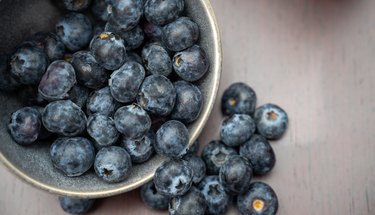
Some superfoods are a lot easier to eat than others, and blueberries are perhaps the easiest. If you're watching your carb intake and are wondering about the number of carbs in blueberries, here's what you need to know.
Tip
One cup of blueberries has 17 grams of carbs.
Video of the Day
Carbs in Blueberries
Like most fruits, blueberries are composed primarily of water and carbs, with very little fat. According to the USDA, blueberries' carbohydrate amount is 17 grams of carbohydrates in 1 cup of blueberries that weighs 140 grams and has 70 calories. Both the protein content and the fat content are approximately 1 gram per cup.
Video of the Day
The carbs in blueberries are from fiber and natural sugars; of the 17 grams of carbs, 4.06 grams are from fiber and 12 grams are from sugar. The American Diabetes Association explains that fiber is a type of carb that works like a natural scrub brush that cleans out your digestive tract. It also helps regulate your blood sugar levels and lowers your risk of heart disease.
You're probably wondering how the carbs in blueberries compare to the carbs in blackberries, strawberries and raspberries. Raspberries have the same amount of carbs as blueberries, while blackberries and strawberries have a somewhat lower carb content; 1 cup of blackberries has 13 grams of carbs and 1 cup of strawberries has 12 grams of carbs.
Health Benefits of Eating Blueberries
Tufts University notes that blueberries are rich in manganese and vitamin C and that they also contain flavonoids like anthocyanins, that give them their rich blue color and many of their health benefits.
According to the North Dakota State University, eating blueberries has been linked to a number of health benefits like lower risk of cancer, heart disease and Alzheimer's disease. They are also good for your eyes, as they help prevent retinal damage from chemical toxins and reduce eye strain.
A September 2018 study published in the International Journal of Molecular Sciences found that the flavonoids in blueberries have anti-cancerous, anti-obesity and anti-inflammatory properties that help prevent chronic diseases. The authors note that blueberries also help keep your bones strong, prevent diabetes, protect your liver and lungs and improve your immunity.
An April 2019 study published in the journal Brain, Behavior and Immunity found that the benefits of eating blueberries go beyond just physical aspects; the study associates blueberries with better mood and better long-term, short-term and spatial memory.
Read more: 4 Major Reasons to Eat More Blueberries
Adding Blueberries to Your Diet
To make the most of the benefits of blueberries, you're probably better off eating them fresh or frozen. Tufts University notes that frozen blueberries retain most of their anthocyanins, so they are almost as good as fresh blueberries.
According to Columbia University, dried blueberries lose around 40 to 50 percent of their antioxidants and are more concentrated sources of sugar and calories, so you're probably better off sticking to fresh or frozen berries as far as possible. Dried blueberries do have a higher concentration of fiber though; just 1 cup provides half your fiber requirement for the day, so they are a good snack if you need more fiber in your diet.
Cooking blueberries at temperatures above 350 degrees Fahrenheit can also affect their polyphenol content, according to Tufts University, so your blueberry muffin may not be as healthy as you think it is. Harvard Health Publishing notes that many baked blueberry treats, like blueberry pie and cheesecake, also contain a lot of sugar and fat, which detract from the benefits of the berries.
- USDA FoodData Central: “Blueberries”
- American Diabetes Association: “Get to Know Carbs”
- USDA FoodData Central: “Raspberries”
- USDA FoodData Central: “Blackberries”
- USDA FoodData Central: “Strawberries”
- Tufts University: “Blueberries Good for Your Blood Pressure and Brain”
- North Dakota State University: “Enjoy the Health Benefits of Blueberries”
- International Journal of Molecular Sciences: “Molecular Mechanism and Health Role of Functional Ingredients in Blueberry for Chronic Disease in Human Beings”
- Brain, Behavior, and Immunity: “The Effect of Blueberry Interventions on Cognitive Performance and Mood: A Systematic Review of Randomized Controlled Trials”
- Columbia University: “Health Benefits of Dried Versus Fresh Blueberries”
- Harvard Health Publishing: “Eat Blueberries and Strawberries Three Times Per Week”